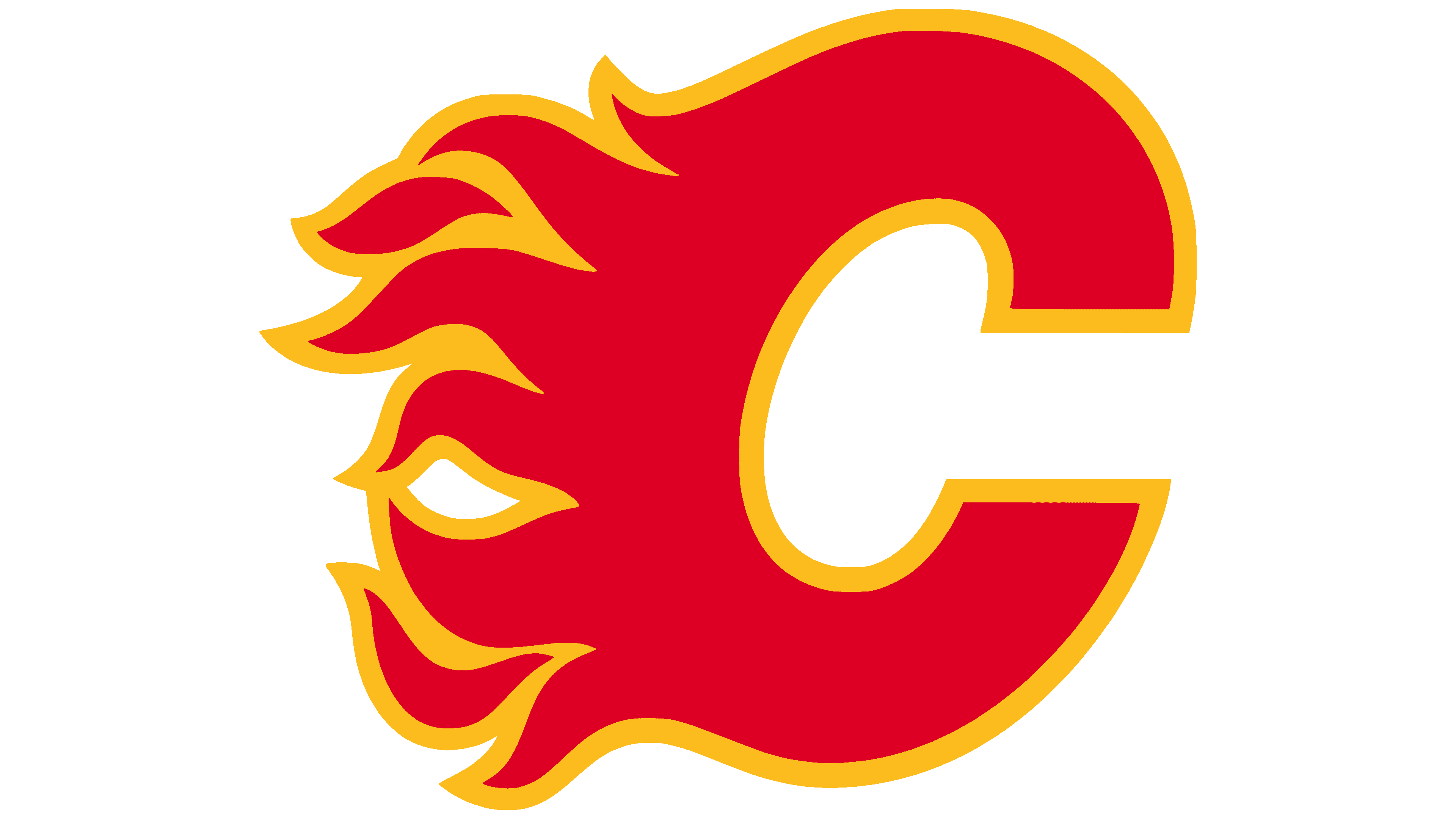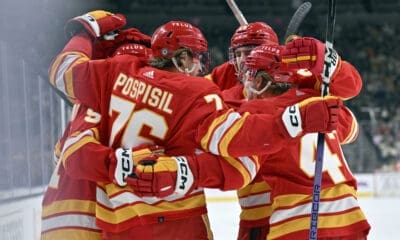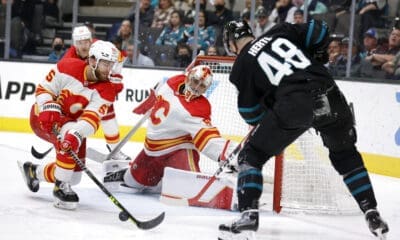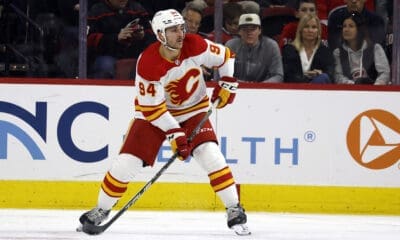Calgary Flames
Continuing Reaction: What to do About Darryl

Over the past seventy-two hours since the Flames‘ official elimination from post-season contention, much has been said on the topic of well, everything, but mostly management, and specifically GM Darryl Sutter. None of it is remotely positive (rightfully so), and all presents rather condemning evidence. Missing the playoffs alone is not the cause for this sentiment, but rather, the straw that broke the camel’s back; the cherry on top of an ice-cream sundae of mistakes that have been compounded over time like DDT or mercury or some other form of toxicity over the past few seasons. The signing of aging core players to restrictive, expensive, multi-year deals with no-trade clauses, the Olli Jokinen trade, overspending on defence and overspending in general, the lack of viable young prospects ready to assume a regular position with the team, the lack of return from the Phaneuf trade, acquiring Ales Kotalik, and trading for Steve Staios. These are all glaring and prominent examples of Sutter’s missteps as a general manager, and each certainly deserves equal attention in the evaluation of his tenure and the predicament the Flames currently find themselves in, as each has likely contributed to the franchise’s current state as much as the next.
These mistakes have all compromised the team's present and foreseeable future and created a John-Ferguson-Junior-esque mess which can likely only be sorted by someone from outside the organization; someone with a fresh perspective on the game whose knowledge extends beyond the understanding of the outdated concepts of "size," "grit," "leadership," and "toughness." Furthermore, nearly each move has been made in effort to "fix" a previous error–a bad contract, lack of cap space, a trade that didn't work out, or to improve upon an area in which the team was lacking because of his own doing. The only analogy I can think to use that woud properly describe Sutter's reign as Flames GM is a string of Christmas lights. Behind every knot you untie and every snag you smooth out, there's another one waiting; and if you'd just put them away properly last year, you wouldn't have had to worry about untangling them in the first place.
Here's what I had to say on the subject after the trade deadline:
After signing both Bourque and Stajan to reasonable but lengthy contract extensions in recent weeks and acquiring Steve Staios and his $2.7 million cap hit for next season, the money Sutter saved by unloading Phaneuf is once again tied up in a group of fairly average players. Rather than using the cap space to chase a player the Flames actually need in the off season, like, I don’t know, a first line centre or winger, and giving himself some flexibility under the cap going forward, he has again dug himself a hole in salary cap hell. There seems to be a pattern here; for every step forward, Darryl Sutter takes two steps back.
I really do respect Darryl’s continued efforts to build a winning team; his dedication to making this franchise competitive year after year really is amazing, and he certainly cannot be criticized for lack of trying.He has always had the right intentions, but some of his efforts have been misguided and old fashioned. At the end of the day, it’s not his fault that the players he signs don’t perform as expected, but this time it seems that he’s made one too many mistakes and has played all his cards. The only real bargaining chips he has left are the big name players–Iginla, Kiprusoff, Regehr, Bouwmeester–and trading one or more of them would almost certainly mean the beginning of the dreaded “rebuild.”Since Ken King essentially admitted that Sutter has an “infinite” contract, It can be assumed that the only way we will see him go is if he resigns when he sees fit. Maybe missing the playoffs will help that process along. I just hope it happens sooner rather than later before I resent him forever for paralyzing the franchise with bad contracts and a murky future, which will likely be pretty damn soon.
A fairly tentative assessment at the time, when it was all most of my fellow bloggers could do to hold back the profanity-laced tirades following the acquisition of press-box seat warmer Ales Kotalik and even more so once "Steady Steve" Staios was welcomed into the fold. My opinion has not changed since then, but my choice of words, after watching this team fail to earn a post-season beth, would certainly be more harsh, more forceful.
George Johnson of the Herald had this to say today:
…Darryl Sutter and this city will always have the spring of 2004. His flinty and iron-fisted rule reinvigorated a drifting franchise, pushed it to the brink, a game, a controversial goal, of a slice of startling immortality. It was a wild, wonderful ride. And for that alone, he deserves a place of honour in this organization’s archives.
In terms of personnel, he brought in Miikka Kiprusoff (saints be praised!), Daymond Langkow, Rene Bourque, signed an unwanted free agent named Mark Giordano, drafted Mikael Backlund.
Sutter also airlifted in Tony Amonte, Bryan Marchment, Jeff Friesen, Todd Bertuzzi, etc., etc. Jettisoned nearly every one of the staunch supporting cast with an outgoing personality — Martin Gelinas, Andrew Ference, Chris Clark, Shean Donovan, etc., etc. — following the ’04 run because they weren’t his type of players. Has spent like Victoria Beckham on a Fifth Avenue shopping spree for average talent, and then, miraculously, been subsequently praised for shedding salaries he agreed to in the first place.
Two more years of Ales Kotalik at $3 million per?
Really, there are limits. Or should be.
Hard to disagree with anything said there. HNIC's Elliotte Friedmen chimed in with a piece of his own:
…If you don’t win, long-term deals can become anchors.
Kiprusoff continues to be one of the best goalies in the league…Regehr, like two other big-ticket Sutter signings – Daymond Langkow and Cory Sarich – slowed noticeably this season. All three of them are locked in for at least two more years. Both Regehr and Langkow have no-move clauses.
The Flames are now committed to $53 million for 17 players next year; $47 million for 12 in 2011-12; and $30 million for six (!) in 2012-13. White is a restricted free agent this summer, Giordano a UFA next year. This is not going to be an easy roster to manage.
Similarly, Kent had this to say in his review of Sutter's performance:
…The team’s future has never looked bleaker thanks to his rabidly desperate mid-season machinations. It’s one thing to gamble future success for short term gain. It’s another thing entirely to make objectively bad bets. Sutter’s moves were all with an eye to firming up the team’s immediate present. None of them did that. What’s more, none of them were likely to do that.
The franchise has a bulk of it’s dollars committed to players over the age of 30 (Jarome Iginla, Daymond Langkow, Robyn Regehr, Miikka Kiprusoff, the others aforementioned), meaning the core is aging and beyond its peak season(s). It has zero difference makers in the organizational pipeline and, with all of two choices inside the top 60 picks over the next two entry drafts, almost no chance of picking up another one any time soon. The best of Iginla, Kipper, Reghr and Langkow has been squandered. There is precious little in the way of budgetary flexibility and prospects to replace them. The assets in hand have been used almost to the point of obsolence while the currency of the future has been spent.
This is the worst of both worlds.
Glance again at the wreckage of the season. Recognize that it is not ill-fortune but the exercise of principles of operating under a cap environment — principles that Sutter has ceaselessly sought to flout for the purpose of “winning now”. Observe that Sutter has now delivered the club back to the apparent hopelessness from whence he retrieved it.
Finally, Greg Wyshynski offers up his take on the prospect of firing Sutter:
Yet if you’re Calgary, you make a change here if you have an undeniably special candidate to fill the position: Steve Yzerman’s name comes to mind immediately. If it’s someone from within the organization or some retread GM, why bother? The change here needs to be sweeping, not simply someone who fits the suit.
But the two questions for every Flames fan: Will ownership and upper management actually make this change? And is there a better alternative out there?
This is the ultimate question, in my mind. Who are the replacement candidates, and is there someone out there, possibly some unheralded executive or assistant GM, who the franchise would be willing to take a risk on? Just about any alternative looks better than what we're currently saddled with, but there is no guarantee that a new general manager will swoop in and instantly make a difference and push this team in the right direction, as we all saw with Brian Burke and the Leafs. It's going to be a long, difficult, and tedious process to siphon off the ill-advised acquisitions, the long-term, expensive contracts and extensive salary comittments to average and/or declining players poisoning this team, and to reverse their effects on the future of the franchise. We'll cross that bridge when we come to it, I suppose.
We now find ourselves in a situation where, regardless of potential for a new general manager, next season’s Flames team will look largely the same as the one that failed to come through on so many occasions this season, with most players already under contract for 2010-11. With the lack of flexibility with this roster, the potential for a rebuild on the fly a lá Philadelphia or to a lesser extent, Colorado, is almost non-existent, barring a miraculous series of trades, buyouts, or demotions. The UFAs this off-season are all support players, at the most–Craig Conroy, Chris Higgins, Eric Nystrom, Jamal Mayers, Brian McGrattan, and Vesa Toskala–and the cap space cleared by the absence of their salaries is almost negligible considering the team’s commitment to next season–17 players signed for $53 million–versus its immediate needs. If some or none of these players are re-signed, than whomever is in charge will need to seek out players to fill their roles at equal or better value under the cap, given what precious little dollars there are to work with. Not an easy job in the present-day NHL. The same can likely be said for the years following, where it appears the situation only stands to become more dire, with six players signed for a total of $30 million in 2012-13.
Is there potential for a better year next season with this roster? It doesn’t appear so, but it’s impossible to tell. Nobody expected Jay Bouwmeester to score three goals, or David Moss to score eight, or Daymond Langkow and Jarome Iginla to produce their lowest point totals since 1998-99 and 2005-06. Nobody predicted that Kipper would turn in his best performance since winning the Vezina or that the forwards acquired in the Phaneuf and Jokinen trades would score a total of eleven goals in a combined eighty-six games played. Is it likely that things will get worse before they get better, with the aforementioned cap crunch, lack of flexibility with the roster, and lack of draft picks and prospects in mind? Yes, very, but the potential for things to stay the same–with the team hovering in that awful middling territory somewhere between “really bad,” “alright,” and “really good”– is probably greater, which is undeniably the most infuriating part of this ordeal. If we think we’ve already lived through the ides of modern-day perpetual mediocrity after four seasons’ worth of first-round exits and one playoff-less spring, we likely haven’t seen anything yet.
by Hayley Mutch








